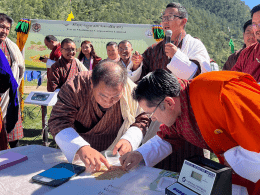In the quiet village of Baney-Bimkhar Chiwog, financial independence is taking root—one chilli at a time. While most men are engaged in other occupations, women have turned to farming, transforming the cultivation of the locally prized Urka Bangla chilli into a thriving source of income.
For many, the vibrant red spice is more than just a crop; it is a lifeline. Annual earnings from chilli sales range between Nu 100,000 and 300,000, allowing women to support their families, invest in education, and meet healthcare and winter expenses.
A Woman-Led Farming Movement
Thirty-one-year-old Dechen Tshomo is among the many women who have dedicated themselves to chilli cultivation. Each morning, she fills a basket with freshly picked chillies, preparing them for the markets in Yangtse town.
“Most of the women here grow vegetables, but Urka Bangla chilli is our main source of income,” she said. “In winter, we have little to sell, so we save our earnings from chilli sales to cover expenses and support our children.”
Women farmers in the area have formed groups to coordinate their efforts, often pooling resources to hire vehicles for transporting their produce to town. Depending on market demand, chillies sell for Nu 70 to 200 per kilogram.
A Lucrative but Challenging Crop
Jamba Deki, another farmer from Bimkhar, said that Trashi Yangtse’s reputation for producing high-quality Urka Bangla chillies has encouraged more farmers to focus on the crop.
“When the harvest is poor, we earn around Nu 60,000 to 70,000. But during good years, our earnings can reach Nu 200,000 to 300,000,” she said.
To maximize yields, farmers now raise seedlings in greenhouses before transplanting them to open fields. The main harvest season runs from July to October, although the crop is cultivated three times a year.
Support Boosts Production
Last year, the agriculture office, with assistance from the Commercial Agriculture and Resilient Livelihoods Enhancement Programme (CARLEP), provided mulching plastic to help reduce weeds and improve soil conditions. This support has contributed to increased production.
In 2024, around 40 households cultivated Urka Bangla chilli on 30 acres of land, producing 48 metric tonnes. With favourable weather this year, farmers are hopeful for an even better yield.
Empowering Women, Strengthening Communities
The success of Urka Bangla chilli farming is more than just an economic achievement—it represents a shift in rural livelihoods, where women are taking the lead in sustaining their families. By turning a traditional crop into a profitable enterprise, the women of Baney-Bimkhar are proving that financial independence can grow from the soil beneath their feet.








